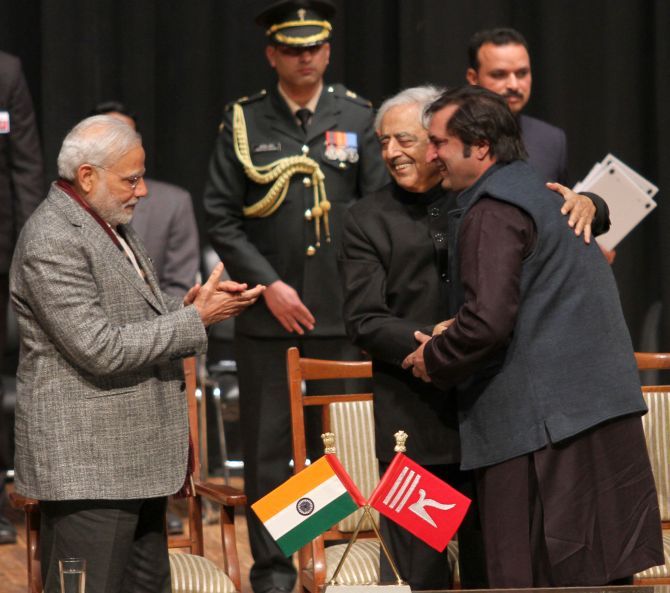
So-called fringe elements on either side, more so in the Saffron Parivar, can easily upset the Modi-Mufti applecart. They only have to drag contentious issues into the limelight to do that, says Mohammad Sayeed Malik.
For quite some time to come, the ideologically odd-looking People's Democratic Party-Bharatiya Janata Party coalition in Jammu and Kashmir, formally inaugurated with fanfare on Sunday, March 1, will continue to be perceived differently like the proverbial blind men's elephant.
Its longevity will also remain perceptibly fragile, given the complex dynamics of Kashmir politics.
That said, this very combination has the best opportunity to change the chronically troublesome political paradigm of the country's only Muslim-majority state. Regional tensions within Jammu and Kashmir, compounded by demographic composition of its three regions -- the Kashmir Valley, Jammu and Ladakh -- have been a key factor in keeping the pot boiling even when the Line of Control is quiet.
The fragmented mandate of the 2014 assembly election brought out these fault lines in their ugliest form. So much so that even a single Hindu candidate out of 12 from the Congress was not elected.
The BJP thus emerged as a compulsion for any worthwhile post-poll combination for the first time ever. Ironically, the BJP was able to get its only Muslim MLA elected from the erstwhile Congress-dominated Jammu region.
Mufti Mohammad Sayeed did not take too long to recognise the uphill task ahead of him. Till the moment it actually happened, any idea of going with the BJP was simply considered unthinkable in the PDP's home ground -- the Kashmir Valley, like almost committing hara kiri. Mufti mustered courage to grab the Hobson's choice, culminating in his installation as the chief minister on Sunday.
The 'Agenda of the Alliance, as the usual common minimum programme of the PDP-BJP alliance is entitled, took two months to conclude.
Frankly, there is hardly any meeting ground, politically or ideologically, between them which in turn demanded razor sharp draftsmanship, more than any other thing, to weave a formulation reasonably agreeable for both sides.
Most of the contentious issues have virtually been left hanging. One must admit that this was an act of great political courage to cobble a viable instrument of governance.
The key word in this arrangement thus is governance, governance and only governance.
Governance has been Mufti's USP vis-a-vis his rivals in the trounced National Conference-Congress coalition.
His brief three-year stint in the PDP-Congress coalition (2002 to 2005) is being fondly remembered in all the three regions as well as within the official machinery itself. Devastating floods in the state in September 2014 exposed the total bankruptcy of the Omar Abdullah-led regime's governance capability.
The outcome of the assembly poll in which the National Conference's legislative strength came down from 30 to 16 only confirmed this fact. Ditto for the Congress.
From a wider perspective, the Kashmir-based PDP's linkage with the BJP could even be a turning point, provided it is safeguarded against the real possibility of miscarriage.
So-called fringe elements on either side, more so in the Saffron Parivar, can easily upset the Narendra Modi-Mufti applecart. They have only to drag contentious issues into the limelight to do that.
It took the PDP and the BJP a huge amount of midnight oil to burn for two months to prepare a mutually acceptable agenda, skipping over a plethora of tricky issues dividing them politically and ideologically.
Mufti's faux pas, soon after his installation, over the peaceful conduct of the 2014 assembly election, only underlined the pitfalls. But for their tie-up, the BJP would have pounced upon Mufti's uncalled for praise of Pakistan and the 'helpful' role of the militants in the peaceful conduct of elections and torn his PDP apart. But that did not happen.
Obviously things are changing in Kashmir. Though the National Conference and the Congress did attempt hauling the new coalition over the coals it did not go far in the euphoria of the fanfare surrounding the installation of the coalition, with Prime Minister Narendra Modi present on the occasion with a galaxy of BJP leaders.
The initial reaction in Jammu has been one of elation. Not so in the Valley. The BJP's maiden entry into power politics in Jammu and Kashmir evokes all sorts of apprehensions in the Valley where it is seen as the thin end of the wedge to change the demographic composition and to erase the state's special status.
When, how and to what extent Mufti succeeds in reducing or eliminating these fears would determine the future prospects of his leadership as much as the political fortune of his PDP. He has gambled with pretty high stakes. Presumably expecting the 'other side' (the BJP) to play ball.
To be fair, Narendra Modi too has walked an extra mile to accommodate the PDP's sensitivities.
If this spirit sustains, the seemingly incompatible coalition sustains too. Otherwise...
Image: Prime Minister Narendra Modi applauds separatist-turned-politician Sajjad Gani Lone, a minister in Jammu and Kashmir Chief Minister Mufti Mohammad Sayeed's government. Photograph: Umar Ganie for Rediff.com
REDIFF RECOMMENDS











 © 2025
© 2025